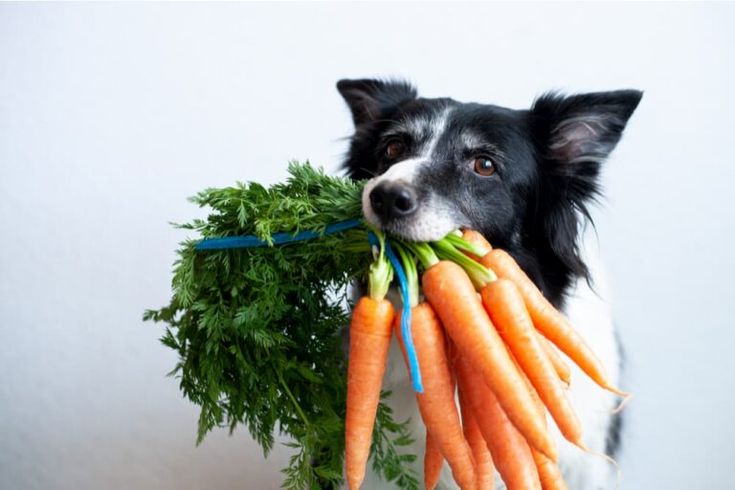
Can my dog eat vegetables? What is good and what is bad for dogs.
We all know how beneficial vegetables can be for humans, but can dogs eat vegetables, too? The answer is: YES however, it depends on the vegetable. While many are safe and even beneficial for our furry pals, others can be hard for them to digest or even toxic.
Benefits of vegetables for dogs
While it is true that dogs simply love and should consume plenty of meat, vegetables can also provide your furry pal with nutrients that are simply absent in any meat that you provide.
Vegetables are rich in vitamins, minerals, fiber and antioxidants which is why we at Nino's Dog Food we include the right vegetables into our meals. They also contain enzymes that aid digestion and are an excellent source of hydration due to their high water content. Its a Win/Win in our eyes!!
However, unlike humans, dogs aren't able to survive on vegetables alone. Your dog should eat a variety of foods in order to maintain well-balanced nutrition.
Below we have put together a list of which we believe dogs can eat and those that are better to avoid.
What vegetables are included in Nino's Dog Food and are safe for dog's to consume?
Broccoli
Broccoli is a good source of fiber, vitamins A, C, E, and K, potassium and contains almost no fat. Broccoli is a great vegetable which assists in general heart health, bone density and immune system for your dog (however all within moderation)
** It is extremely important that you do not add more broccoli into their diet (over 25% of their daily intake) as it is considered toxic, due to a naturally occurring compound found in the florets called isothiocyanate.
We at Nino's Dog Food ensure we add a sufficient amount of Broccoli into our meals which has been carefully steamed and minced for easy digestion.
Carrots
Many dog's love to eat Carrots as a tasty, crunchy treat. Carrots are rich in dietary fiber, vitamins A, B, C, D, E and K, potassium, calcium and not to mention they are low in calories.
DID YOU KNOW - When eaten raw, these orange vegetables can help keep your doggy’s teeth clean. However, raw carrots can be difficult to digest, which is why it might be a better idea to serve them steamed if possible.
**Please note - Carrots are high in fiber so please feed your furry pals these tasty snacks in moderation as they can result in gas and a upset stomach if consumed too much.
We at Nino's Dog Food will shred carrots into our meals which then softens from the meat's moisture and ensures it becomes easily digestible for your dog.
Zucchini
Zucchini is low in calories, rich in fiber, and offers an abundance of vitamins and minerals that strengthen dogs’ bones, kidneys, and hearts. Plus not to mention it has a high water content making it a nutritious, hydrating vegetable for your pup
Cauliflower
Cauliflower provides omega-3 fatty acids, vitamins B, C, and K, potassium, folate and calcium, all of which are great for strengthening the immune system.
Similar to other cruciferous vegetables on this list, cauliflower is safe only in small amounts as it can make your dog gassy. Raw cauliflower is difficult to digest so it’s best to serve it to your pet lightly cooked (steamed).
We at Nino's Dog Food will cook the cauliflower followed by mincing it to ensure easy digestion for your pup.
Beans
Black Beans and Red Kidney Beans are a great source of plant protein and nutrients like potassium, magnesium, and folate. However, they can easily cause gas, so they should be fed in moderate amounts. Green beans are great for dogs because they’re full of nutrients and can be served raw, steamed, or boiled.
Spinach
Spinach is a great source of iron, magnesium, and contains a large amount of vitamins A, B, C, and E.
Once again, this particular vegetable should only be consumed in small quantities.
Kale
Kale is considered a superfood for humans and guess what .. they offer health benefits for dogs, too!
This superfood is rich in vitamins A, C, E. K, and calcium, this dark, leafy vegetable is great for your dogs vision, immunity, and bones. It’s also a good source of iron, the mineral responsible for healthy red blood cells.
Please note - this vegetable is to be consumed in small quantities.
Peas
Sugar snap, English, snow, and garden peas are all good for dogs. These little greens balls are rich in vitamins A, B, C and K, minerals like iron, magnesium, potassium, and zinc, as well as fiber and protein.
What are some vegetables that should be avoided for dogs?
Onions
Garlic
Mushrooms
Grapes
Unripened Tomatoes
Leek
Rhubarb
Cherries
Key Takeaways
- Vegetables can be a tasty treat for your dog. They’re a great source of vitamins, minerals, fiber, antioxidants, and enzymes which are not found in meat.
- As a responsible pet parent, you should know what vegetables your dog can safely eat and avoid the ones that are likely to cause health issues. Please do your research and consult with a professional should you have any concerns or questions about any particular vegetable.
- Feed vegetables in moderate quantities.
- If you notice anything unusual after your pup has eaten veggies, contact your vet as soon as possible.